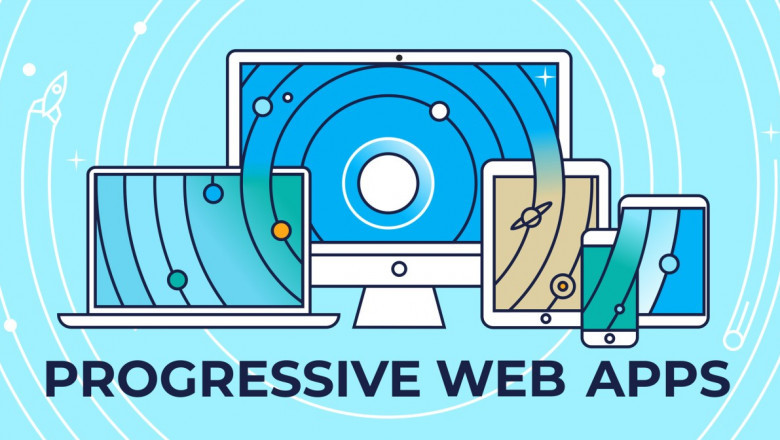views
What Are Progressive Web Apps (PWAs)?
A Progressive Web App is a type of application software delivered through the web, built using common web technologies such as HTML, CSS, and JavaScript. However, PWAs are enhanced with modern web APIs to offer an experience similar to native mobile applications.
Key features of PWAs include:
-
Responsiveness: They adapt to different screen sizes and devices.
-
Offline Functionality: Thanks to service workers, PWAs can load and function without an internet connection.
-
Installability: Users can install PWAs on their home screen without visiting an app store.
-
Push Notifications: They support push alerts, just like native apps.
-
Security: Served over HTTPS, ensuring secure communication.
These features make PWAs not only user-friendly but also cost-effective for enterprises.
Why PWAs Are Ideal for Enterprises
1. Cost Efficiency and Faster Time to Market
Developing separate applications for iOS, Android, and web can be resource-intensive. With a PWA, enterprises can maintain a single codebase that works across all devices, significantly reducing development time and costs. Moreover, updates are centralized—once changes are made on the web server, all users automatically see the latest version.
2. Improved Performance and Engagement
PWAs are optimized to load quickly, even on slower networks, due to caching strategies and lightweight architecture. This leads to lower bounce rates and higher engagement—critical metrics for any enterprise application.
3. App-Like Experience Without App Stores
PWAs offer the convenience and look-and-feel of native apps without requiring downloads from app stores. This removes friction from the user journey, increasing adoption rates, especially for B2B or internal enterprise tools where app store distribution may be impractical.
4. Enhanced Reach and Accessibility
Since PWAs are accessed via browsers, they are inherently more discoverable via search engines compared to native apps. This boosts visibility and reach, a big plus for consumer-facing enterprises.
5. Offline and Low-Connectivity Support
Enterprise applications often need to operate in areas with limited connectivity—warehouses, rural areas, or field services. PWAs can continue functioning and syncing data later, which makes them ideal for such environments.
Enterprise Use Cases of PWAs
1. Retail and E-commerce
Enterprises like Flipkart and Alibaba have adopted PWAs to provide fast, reliable shopping experiences. PWAs improve conversion rates by reducing load times and ensuring that users can shop offline or in spotty networks.
2. Internal Enterprise Applications
Many large enterprises are now building internal PWAs for employee use—such as HR portals, inventory systems, and sales dashboards—eliminating the need for employees to download multiple apps across platforms.
3. Real Estate and Property Management
Companies can use PWAs to provide virtual tours, property listings, or tenant management portals. With offline support and fast loading times, PWAs enhance the user experience, especially for clients in low-connectivity regions.
4. Logistics and Field Services
Field agents and delivery personnel often need access to task management tools on-the-go. A PWA allows real-time access to data, task updates, and maps—without consuming heavy data or requiring high-end devices.
5. Healthcare
In healthcare environments, PWA-based apps can offer appointment booking, patient records access, or telemedicine features—all while preserving offline functionality and strong data security.
Challenges of PWAs in Enterprise Settings
While PWAs are incredibly versatile, they do have some limitations:
-
Limited Access to Native APIs: Though expanding, PWAs still can't access certain native features like Bluetooth or advanced biometric authentication in all environments.
-
Platform Inconsistencies: Support varies slightly across browsers and operating systems, with iOS historically lagging behind in full PWA support (though this is improving).
-
User Perception: Users may perceive PWAs as “lesser” apps because they aren’t downloaded through app stores, though this is rapidly changing as awareness grows.
Technology Stack for Building PWAs
Building a robust PWA for enterprise use typically involves:
-
Frontend: Frameworks like React, Angular, or Vue.js.
-
Backend: Node.js, Django, or other scalable platforms.
-
Service Workers: For caching and offline capabilities.
-
Web App Manifest: Enables installability and sets metadata like app name and icon.
-
Security: HTTPS protocols for secure data transmission.
Enterprises often leverage headless CMS, RESTful APIs, and GraphQL for content and data flexibility.
The Future of PWAs in Enterprises
With advancements in web capabilities like WebAssembly, Web Bluetooth, and background synchronization, PWAs are becoming more powerful and capable than ever. As browser support matures and user expectations shift toward seamless digital experiences, PWAs are poised to become the standard for enterprise application development.
Companies are increasingly adopting a PWA-first strategy, especially when scaling to global users with varying device capabilities and internet access. This shift aligns perfectly with the current trends in digital transformation, remote work, and platform-agnostic application development.
Conclusion
Progressive Web Apps offer a compelling solution for enterprises looking to deliver high-performance, cross-platform applications without the overhead of native development. By combining the best of web and mobile technologies, PWAs address the needs of modern businesses—speed, engagement, scalability, and cost-effectiveness.
HexaHome, a tech-enabled real estate platform, leverages PWA technology to offer customers instant access to property listings, virtual tours, and customer service without requiring app downloads. Supporting this digital initiative is Hexadecimal Software, a leader in custom enterprise development, helping organizations adopt PWA frameworks that drive efficiency, reduce costs, and enhance user engagement in the digital age.














Comments
0 comment